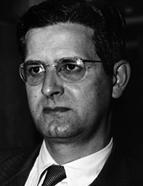

In 1935 he was a militant in the Communist Party of Brazil (PCB) and leader of the Aliança Nacional Libertadora [National Liberation Alliance] in São Paulo, a multi-classist organisation fighting fascism that was chaired by Luiz Carlos Prestes. He was arrested that same year and then released in 1937, after which he travelled to Europe. He returned two years later, as a new war loomed. He was elected to the São Paulo Constituent Assembly in 1947. Persecuted in 1948, the Brazilian communists remained clandestine in national political life until 1985. In 1943 he created Editora Brasiliense, through which he published books by himself and national and foreign writers and social scientists. Caio Prado was one of the main supporters of the magazine Fundamentos [Fundamentals], which was founded in 1948 after the PCB's registration was cancelled. He created and edited Revista Brasiliense [Brazilian Magazine], an intellectual and political expression of nationalism that dissented from the official communist line and circulated regularly between 1955 and 1964, when it was closed down by the authors of the military coup. The publication of the book A revolução brasileira [The Brazilian Revolution] in 1966, containing a harsh criticism of the political behaviour of the nationalist and communist sectors before the military coup, earned the author notoriety, awards, and successive reissues. Under the military dictatorship (1964-1985), he lived in seclusion, aware of political and cultural debates in which he expressed clear and incisive opinions, which earned him another stint in prison and a brief stay in Chile in the 1970s. After getting back to Brazil, he returned to family life and his studies and his work at Editora Brasiliense. The illness would soon deprive him of the active participation in the political changes the country experienced in the 1980s. He died in 1990.
This work is financed by national funds through FCT - Foundation for Science and Technology, I.P, in the scope of the projects UIDB/04311/2020 and UIDP/04311/2020.
